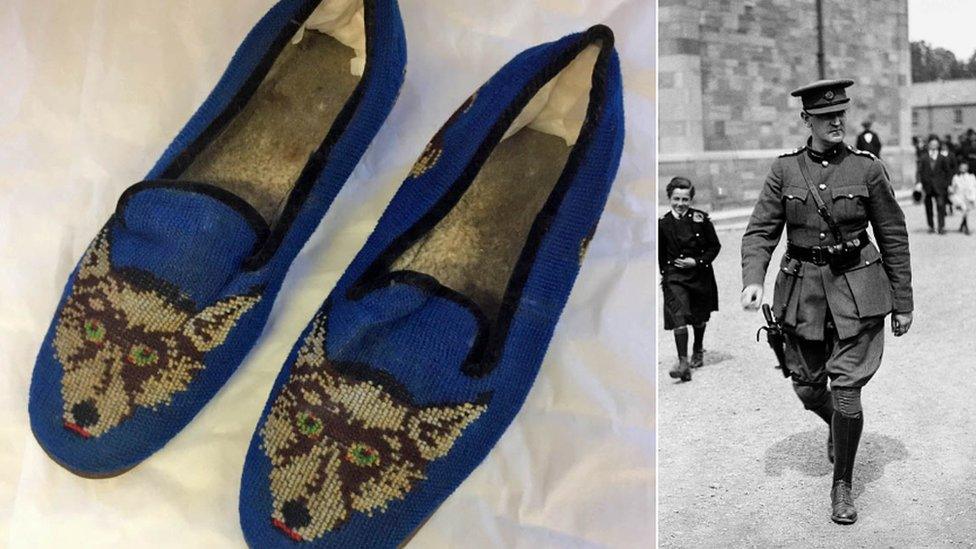Michael Collins a 'great hero of Irish history', says Mícheál Martin
- Published
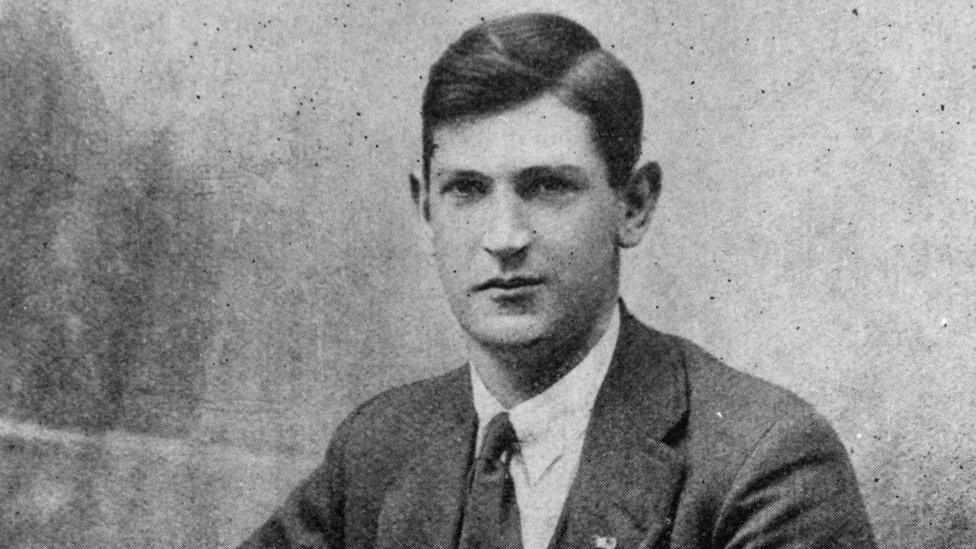
Michael Collins, one of the most prominent figures in the Irish revolution, was shot dead 100 years ago
Michael Collins has been described by the taoiseach (Irish PM) as "one of the great heroes of Irish history".
Thousands of people have attended a centenary commemoration of the death of IRA leader Michael Collins at Béal na Bláth in west Cork.
He was shot dead by former colleagues in an ambush 100 years ago on Monday during the Irish Civil War.
It is the first time a leader of Fianna Fáil has addressed the event which is associated with rivals Fine Gael.
Both parties largely have their origins in the civil war.
Fianna Fáil leader Mícheál Martin said Collins played "an irreplaceable role in securing Irish freedom".
He said it was his "honour and privilege" to join spectators in paying tribute.
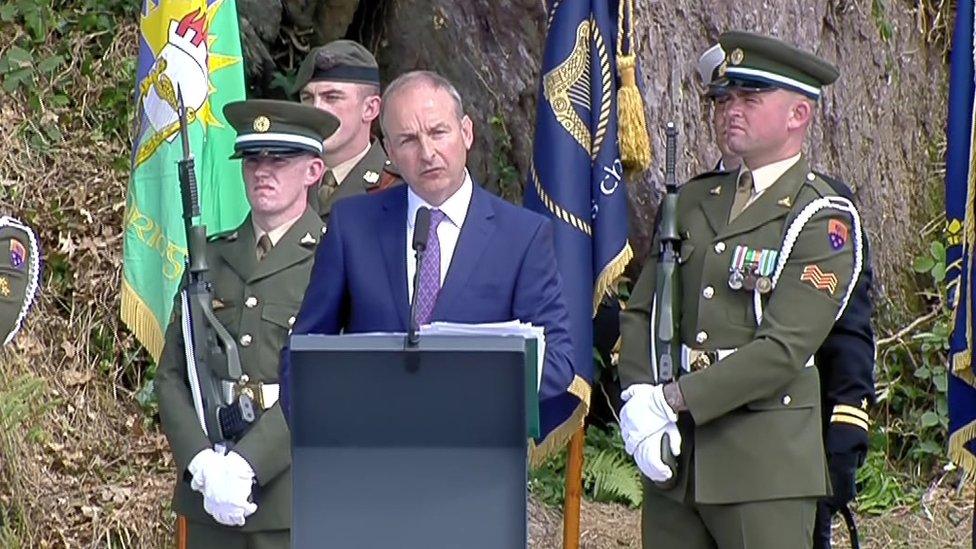
No Fianna Fáil leader had ever addressed the commemoration
He told spectators that the Good Friday Agreement was a "truly historic breakthrough of democratic politics" and it remains a challenge "to do the hard work of moving words to real action on building a shared island - an island where we show respect for our past but we embrace the much harder work of reaching out and respecting each other".
"Collins always had a sense of the bigger picture of our complex society and the challenge of bringing it together," he added.
Collins, who was also the leader of the provisional government at the time of his death, supported the 1921 Anglo-Irish Treaty which created an independent Ireland in 26 of the 32 counties.
However, those who opposed the treaty argued that it did not create the republic proclaimed in the Easter 1916 uprising against British rule and supported by voters in the 1918 general election.
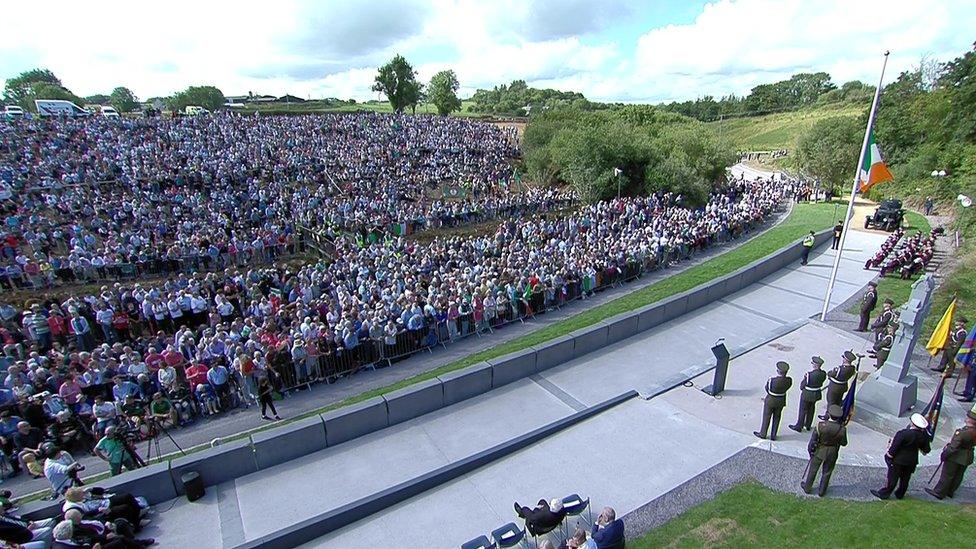
The event took place in west Cork
"For the political tradition represented by Fine Gael, this [commemoration] has long been a place to meet together and to remember a leader who has always provided a special inspiration for them," said Mr Martin.
"However, it is also an important site for all who honour and respect our independence struggle and our democracy.
"It is one of the greatest achievements of the last century that different democratic traditions have worked hard to show respect and develop a new understanding of each other."
Despite their past antagonism and rivalry, both Fianna Fáil and Fine Gael are currently in a coalition government with the Greens in the Republic of Ireland but the attendance of Mícheál Martin, who is also the taoiseach (prime minister), is still being seen as symbolically important in healing old wounds.
The late Brian Lenihan, a former Fianna Fáil finance minister, once addressed the annual commemoration, but no party leader previously has.
The tánaiste (deputy prime minister) and Fine Gael leader Leo Varadkar also made a speech at the event.
Both parties now have another foe - Sinn Féin, led by Mary-Lou McDonald.
She was not in attendance, even though Collins was still technically a member of a previous version of Sinn Féin at the time of his killing.
In a tweet after the event, Ms McDonald said Collins "is a giant of Irish revolutionary struggle".
"He deserves commemoration and respect from all," she added.
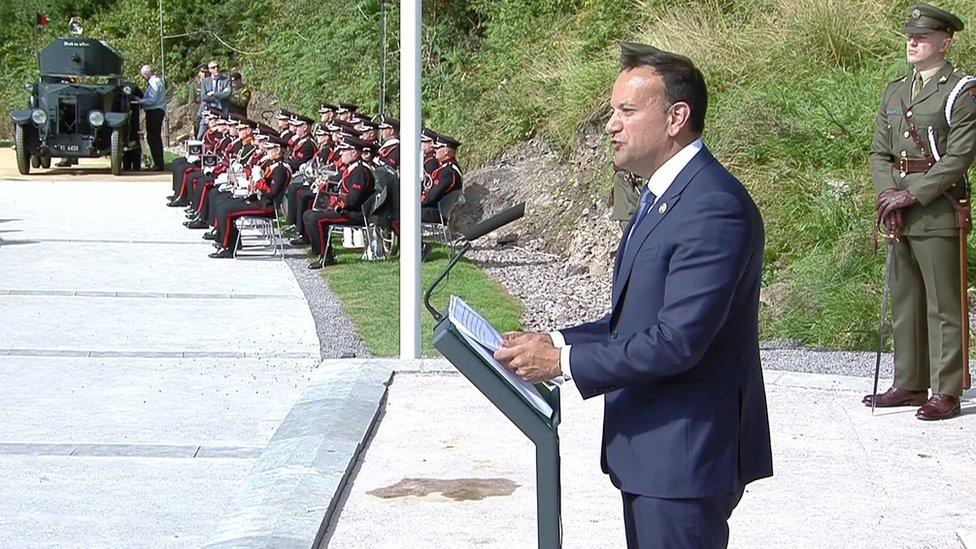
Tánaiste Leo Varadkar also addressed the crowd at Béal na Bláth on Sunday afternoon
Mr Varadkar described Collins as "the great prophet of freedom who was killed before we reached the promised land".
"The genius of Michael Collins was that he saw the promise and the potential of Ireland. What made his vision so radical and original was that it was prepared to go beyond narrow definitions and rigid labels."
He added: "Today we make history of a different kind with two orations, one by the taoiseach and tánaiste of the day, the leaders of the two political parties which emerged out of the civil war, and which for too long were divided by mutual antagonism."

Who was Michael Collins?
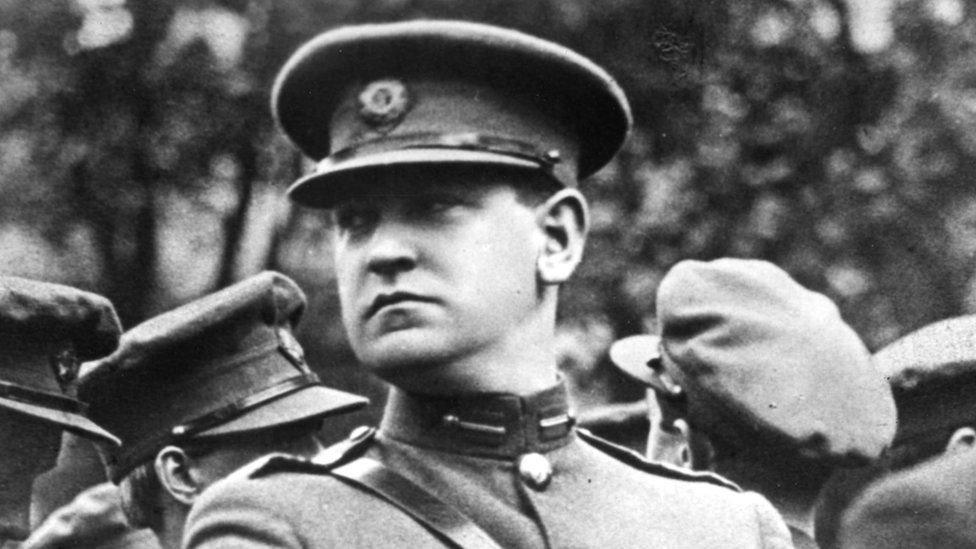
Michael Collins was a politician and military leader in revolutionary Ireland
Born on a farm in rural County Cork in 1890, Collins grew up to be one of the most prominent figures in the Irish revolution, which led to the partition of the island in 1921.
He moved from Cork to London as a teenager and worked for the British Civil Service as a postal clerk, but he returned to Ireland almost a decade later and took part in the 1916 Easter Rising.
That brief rebellion against British rule was crushed, but two years later Sinn Féin won a landslide election victory and set up a new breakaway government in Dublin.
Collins, by that stage an elected MP, became both a minister in the provisional government and director of intelligence for the Irish Republican Army (IRA).
Following the Irish War of Independence (1919-1921), a reluctant Collins was sent to London by de Valera to negotiate a peace deal.
The controversial 1921 Anglo-Irish Treaty created an independent Irish Free State, but it angered many republicans as it appeared to copper fasten Britain's recent partition of Ireland.
The treaty caused a bitter split in the republican movement and within months, tensions boiled over into the Irish Civil War.
Collins became commander-in-chief of the Free State's new National Army as well as chairman (leader) of the provisional government.
His tenure in charge was short-lived, however, as he was assassinated by anti-treaty forces in his native County Cork on 22 August, 1922.

As part of the commemoration a new stone marker has been established to show the exact spot in Béal na Bláth where he was said to have been killed.
It is hoped the marker will address any confusion for where Collins was killed, as it is often mistaken for the location of a memorial cross.
Related topics
- Published21 August 2022
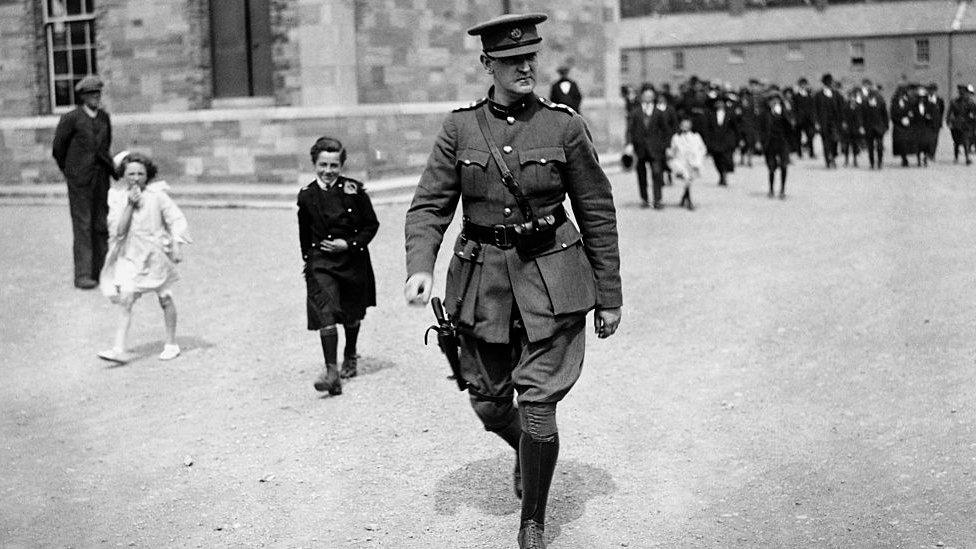
- Published25 February 2022
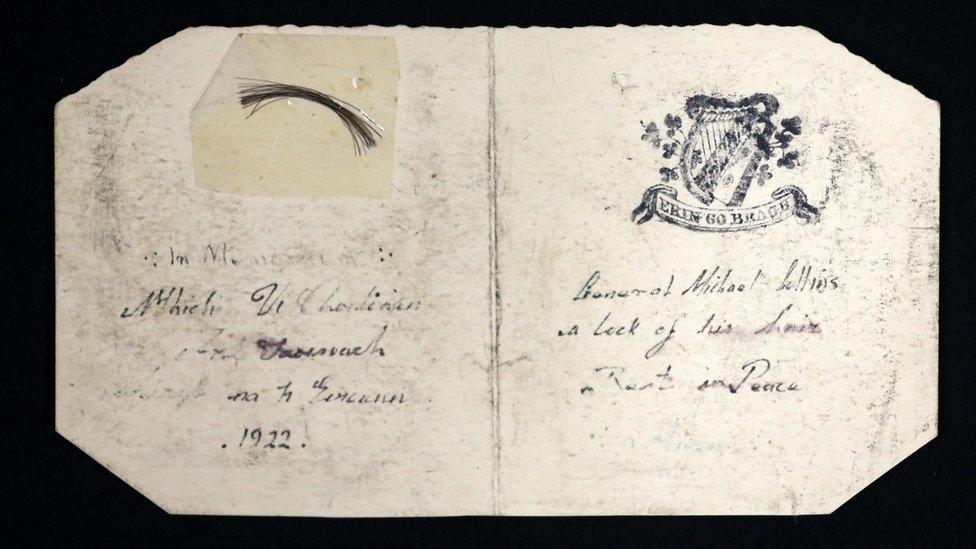
- Published9 November 2021
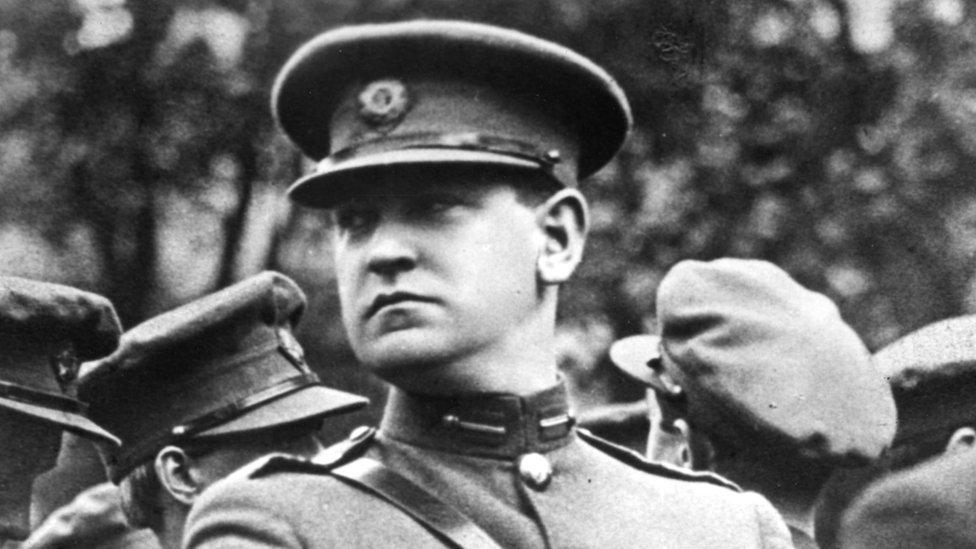
- Published28 September 2021
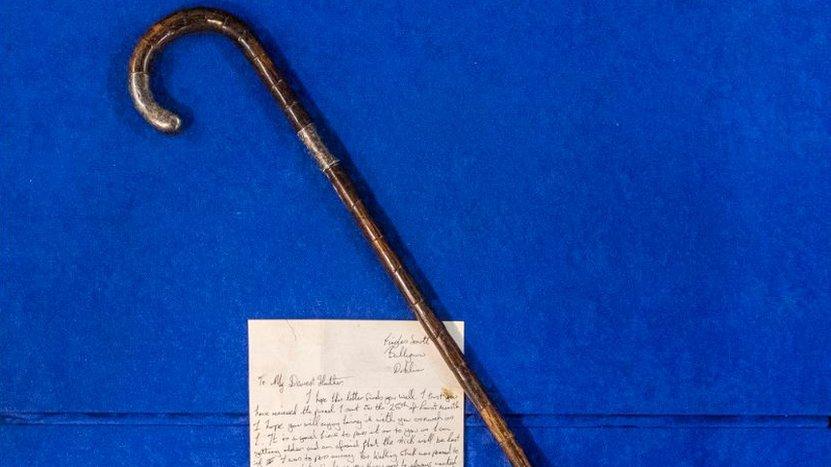
- Published27 February 2021
